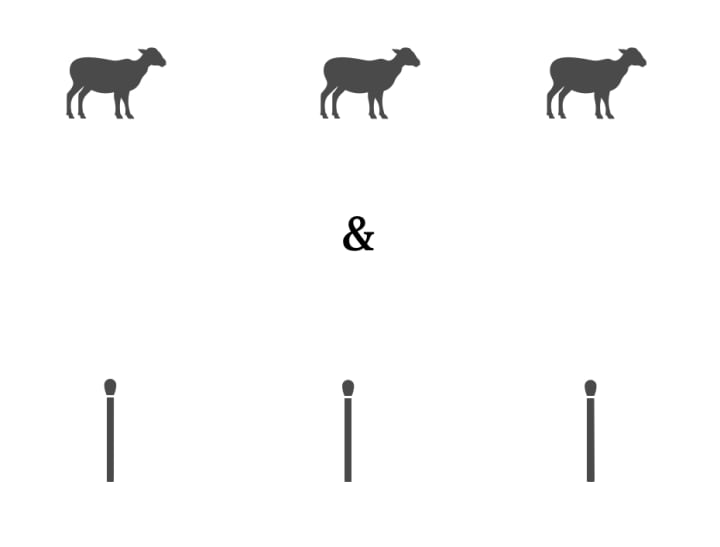Where did numbers come from??
A question which intrigued me throughout my childhood...

I had been curious about the answer to this question for a very long time when I was a kid! but I forgot about it as I grew older.
But when I was in 11th std. I came across the concept of Complex numbers, which was completely against my understanding of numbers (or any other kid in 11th std. for that matter). It was because it had a number ‘i’ which was equal to the square root of ‘-1'. For me, it was blasphemy! No number if squared gives a negative result!!!
This concept was impossible for me to digest, I couldn’t think of any convincing reason why SUCH A THING WOULD BE DEVELOPED???
And the above question captured my imagination! Why were numbers developed in the first place?
I gave it a lot of thought and after 2 days of continuous thinking, I formed an idea that made perfect sense for me. It also helped me understand complex numbers!
Please read ahead and let me know how you feel!
An expedition to satisfy our intellects!
Before we proceed let's talk a little about the nature of mathematics itself. Its significance lies central to the fact that nothing satisfies the curious mind more than the understanding of the deepest level.
That’s the reason I am writing this and perhaps the lack of such understanding was the reason to strive for it, even more, when I was first learning the subject.
Nature of Mathematics and the origin of numbers!
Coming to the point, to understand what mathematics is, let’s go to its roots. The most primary and fundamental concept of mathematics has to be the idea of numbers. Just think if you could imagine mathematics without numbers?
Therefore it is wise to assume, mathematics started with the idea of numbers. Which was first conceived by early men.
When I was in upper K.G. I was told this story about an early man who wanted to ensure all his sheep came back after grazing. So he allowed the sheep to go one by one and for each, he kept a pebble at some place. When they returned he threw each pebble in the river. So in the end, if no pebble were left then it would mean all the sheep had returned.
Later on, our chap realized that he could use other things like fingers, sticks, etc. to do the same job. On thinking further and after due discussion with his peers they somehow concluded :

are somehow the same.
The two groups of unrelated things meant the same from the point of view of early men when their intention was to make sure no sheep were left behind.
Therefore our ancestors understood, in order to make sure that all the sheep (any other object as well) were safe and secure and none missing, they could check with some known set of objects.
Obviously, they found it easier to create markings on the cave walls. Next, they might have developed names for different markings. Which we know today as the numbers.
What’s the point?
Believe me, there are some very astute points in the above story to takeaway. Which has the potential of simplifying very complex concepts like that of complex numbers, calculus & other concepts of mathematics.
Allow me to demonstrate:
First, let us see the most basic inferences from the story:
Numbers must have been the first equations developed by man. i.e for the first time they were able to realize ‘this’ and ‘that’ are the same or things on the right-hand side are the same as the things on the left-hand side! (CONCEPTION OF THE IDEA OF EQUALITY)
An idea to just meet some basic need of an early man, snowballs into something so powerful (numbers) which further snowballs into the most dreaded subject taught to students (Maths) and also the most useful one.
The power of numbers and mathematics in general lies in the fact that it can have a vast application. Just like early men could use the idea to keep track of anything they possessed.
In other words, you master these ideas (all maths) and you have command over a lot of different scenarios in nature only limited by the extent of one’s imagination and understanding.
Therefore, the most important thing to understand here is, mathematics originated as a tool to help us achieve what we desired. Which by design, was independent of the specific nature of the desire. As it could be applied in general to all the similar situations where the nature of what we desire was the same but the specifics were different!
Perhaps, the greatest heritage which has been passed on to us from first humans has been the evolution of this idea.
After all the developments that mathematics has gone through, at the core, it has remained the same, which is a tool to help us fulfill our desire. It’s just that the desire has evolved from counting sheep to understanding the natural phenomena, the structure of matter, the universe, analyzing the stock trends, etc. to name a few.
With this clarity about the nature of mathematics, it’s highly imperative that we understand the desire behind the development of an idea when we intend to study it.
Coming back to complex numbers!
So we have developed a theory about the origin of numbers which obviously could not be verified, but gives a good explanation! The core idea in our discussion was that mathematics is the tool we use to meet our desires.
Now what desire could be met with the square root of ‘-1' ?????
Before I give my answer I would like to re-iterate that we developed numbers because we needed them! Similarly, we have developed this new kind of number which is equal to the square root of ‘-1'. So we must have needed it the only question is why did we need it?
Well, we can at least be sure that there must be scenarios that suggested to the scientists and mathematicians that if we imagine such a number other findings would make sense…
Now was it just to make all kinds of equations solvable, i.e like, x²+1=0 or there was more to it?
I will be back with the answer in my next article…..!






Comments
There are no comments for this story
Be the first to respond and start the conversation.